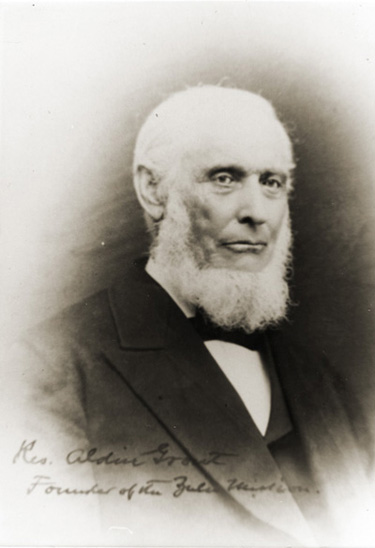Background on Aldin Grout

Rev. Aldin Grout
A pioneering American missionary among the Zulus, Aldin Grout was born at Pelham, Mass., on Sept. 3, 1803. The son of Joel Grout (1765-1835) and Asenath Wilder (1767-1868), Grout graduated from Amherst College with the class of 1831 and while in Amherst, was swept up in an intense revival that led him to dedicate his life to propagating the gospel. After preparing for the ministry at the Andover Theological Seminary (MA 1834), he received an appointment from the American Board of Commissioners of Foreign Missions to serve as one of six missionaries seeking to build a base among the Zulus of southern Africa.
Required by the ABCFM to be married before entering the field, Grout wed Hannah Davis on Nov. 17, 1834. The daughter of Ethan and Eliza Davis, Hannah was born in Holden, Mass., on Feb. 26, 1805, and had, as the History of Holden reported, a mind that "was impressed with the importance of personal religion." Educated at Mrs. Fiske's boarding school in Keene, N.H., and at the Ipswich Female Seminary, she seems to have been a natural for the missionary life. Her brother Elnathan -- a graduate of Williams College and the Theological Institute at Hartford, Conn. -- had originally intended to pursue missionary work in South Africa, but relented, becoming a home missionary for two years before settling into pastorates in Ashburnham, Fitchburg, and Auburn, Mass.
Aldin and Hannah Grout sailed from Boston on Dec. 3, 1834, aboard the bark Burlington, arriving at Cape Town on Feb. 5, 1835. After a period of acclimation and preparation, three of the missionaries, David Lindley, H. L. Venable, and Alexander E. Wilson headed north to Matabeleland, while Grout, George Champion, Newton Adams, and their wives were assigned to Natal, relocating to Port Elizabeth early in the fall. Grout's daughter, Relief Oriana Grout, was born in Bethelsdorp on Dec. 9, 1835, the first American missionary child in the region.
Although Hannah languished in ill health after the birth, the missionaries left their wives in Port Elizabeth and sailed to Port Natal (now Durban), then crossed into the interior to make contact with Dingane, half-brother and successor of Shaka Zulu. Several of Dingane's inDunas were skeptical, if not hostile to the Americans, citing a fear for what had been predicted to Shaka, "that one white man after another would come into the country and ask to build a house and live till at last an army would come and take their country from them." After a tense negotiation, however, Dingane agree in February 1835, to permit the missionaries to set up a school at Ginani on the Umsunduzi River to teach reading and writing.
As the agreement was being reached, Hannah Grout's post-partum consumption worsened, ending in her death on Feb. 24, 1836. She passed "without a groan, a sigh, a struggle, or even a motion of her muscles," Aldin wrote, and yet even after such a personal loss, he continued on for another twenty months until December 1837, when he took a leave to take his infant daughter back to the United States. His absence came at an unfortunate time: the fledgling mission stalled and was forced to shutter in the face of a renewal of conflict between the Zulus and Boers.
At home, Grout set plans for his return to South Africa. On Nov. 23, 1838, he married for a second time, wedded to Charlotte Bailey, a resident of Holden and a graduate of Mount Holyoke College. Charlotte proved Aldin's equal in missionary zeal. After the couple returned to South Africa in the spring 1840, Grout obtained permission of Mpanda, Dingane's successor, to establish a new mission and in April 1841, and he and Charlotte built Inkanyezi station near Empangeni. A brief suspension of ABCFM activity in Natal due a financial crisis in 1844 led Grout to retrench in Cape Town, but by June, he was back in the field, working as a governmental missionary for the state of Natal. As soon as he reasonably could, he reestablished ties with the ABCFM and set about establishing the Umvoti Mission Station in 1844. With the exception of a furlough 1855 and 1856, Aldin and Charlotte Grout remained in South Africa until 1870, when poor health necessitated Aldin's retirement.
All three children of Aldin and Charlotte Grout were born in Umvoti: daughter Eliza Charlotte, became the wife of Congregational minister Frank H. Foster, and two sons Humphrey Grout and Aldin Philip Faure Grout, became successful greenhouse operators in Springfield, although both died as paupers after a bank failure. Aldin's oldest daughter, Relief Oriana, eventually returned to Africa, becoming wife of missionary William F. Ireland. She served for many years as principal of the Ireland Home for Zulu Girls (Adams College), a college started by her husband at Amanzimtote.
Aldin Grout retired from missionary work in 1870 and settled in Springfield, Mass. Despite his age and uncertain health, he remained active in the cause, writing on his African experiences and collaborating for the ABCFM in the publication the first complete translation of the Bible into the Zulu language. He died in Springfield, Mass., on Feb. 12, 1894, followed by Charlotte on Dec. 26, 1896. The couple are buried in Springfield, Mass. Their sons are buried with them, in part thanks to funds raised in memory of Aldin and Charlotte at the Umvoti Mission.

















